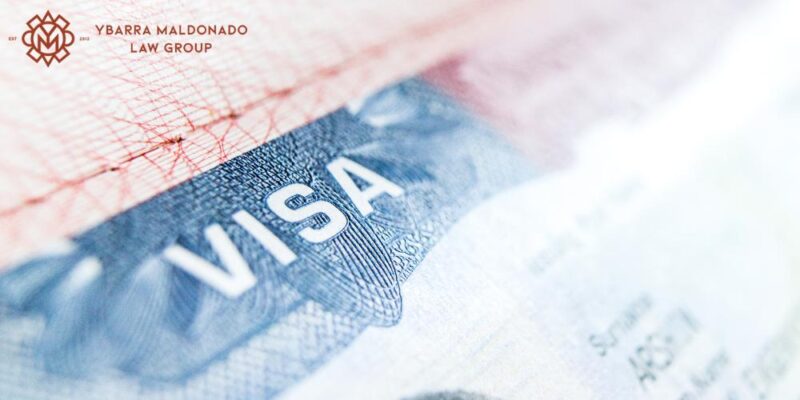K1 Visa Income Requirements 2023
Home » Practice Areas » Phoenix Immigration Lawyer » K1 Visa Lawyer » K1 Visa Income Requirements 2023
DON’T HESITATE TO REACH OUT TO US!
Our Law Firm is committed to becoming the best Law Firm for Latino, migrant, and Spanish speaking communities in Arizona.
A Complete Guide to the Income Requirements for K-1 Visa

One of the most common worries of fiancé visa sponsors is meeting the income requirements. If your fiancé comes to the U.S. to marry you and eventually live with you, you must ensure you have the funds to support your future spouse. The United States government sets a minimum income requirement for fiancé visas to ensure that applicants won’t need government assistance in the future. In the following sections, we outline the 2023 K1 visa income requirements, as well as how you can meet them.
The Phoenix immigration lawyers at Ybarra Maldonado Law Group have handled countless immigration cases, including those involving K visas. If you and your spouse-to-be want to initiate the fiancé visa process, our team can help. To schedule a case evaluation with us about your case, please call our Phoenix law firm at 602-910-4040 today.
What Are the Income Requirements for a K1 Visa in 2023?
For your application to be considered, you must prove that your stable gross earnings after business deductions exceed 125% of the Federal Poverty Guidelines. For active duty service members, their earnings must exceed 100% of the HHS poverty guidelines.
To view the latest version of the poverty guidelines, check with the Department of Health and Human Services. It is updated each year so you can easily look up the requirements.
2023 K-1 Income Requirements Chart
The below chart applies to K-1 visa cases in which Form I-864 is required. If Form I-864 is not required, the sponsor must meet 100% of the poverty guidelines.
|
Household Size |
100% of HHS Poverty Guidelines |
125% of HHS Poverty Guidelines |
|
Active Duty Service Members |
All Other Sponsors |
|
|
2 |
$19, 720 |
$24,650 |
|
3 |
$24,860 |
$31,075 |
|
4 |
$30,000 |
$37,500 |
|
5 |
$35,140 |
$43,925 |
|
6 |
$40,280 |
$50,350 |
|
7 |
$45,420 |
$56,775 |
|
8 |
$50,560 |
$63,200 |
|
Each additional person |
+$5,140 |
+$6,425 |
Keep in mind that these are minimum requirements. Just because you meet these requirements doesn’t mean you are in the clear. Your petition can still be denied for financial reasons. It’s also important to note that the poverty line for each state is different. The amount of dependents in your household will also affect the specific amount of income required for your case.
K-1 Visa Documents Checklist

Before you submit your Petition for Alien Fiancé, your online nonimmigrant visa application, or your affidavit of support, you should gather sufficient documentation for your case. These documents will serve, in part, to prove that you have sufficient income to support your fiancé.
- Passports for both the U.S. citizen fiancé and the alien fiancé
- One passport-style photo for the U.S. citizen fiancé
- Two passport-style photos for the alien fiancé
- Birth certificate for the foreign fiancé
- Proof of citizenship for the U.S. citizen fiancé
- Police documents for the foreign fiancé
- Evidence that the two parties met in person within 2 years of applying for a K-1 visa
- Statements of intent to marry from both parties
- Medical exam results from the foreign fiancé
- Federal income tax return documents for the U.S. citizen fiancé
- Affidavit of Support (Form I-134) submitted by the petitioner
- Form I-94, Arrival/Departure Record
- In certain cases, either party may also be required to submit evidence of a completed divorce or a legal name change.
What Is Considered Proof of a Bona Fide Relationship?
The United States Citizenship and Immigration Services will also require sufficient proof of a real, bona fide relationship between the two parties. They request this proof to ensure they are not undergoing the K-1 visa process simply for immigration benefits. Some examples of valid proof of a relationship include the following.
- Photos: Social media pictures of outings or date nights
- Communications: Letters, emails, text messages, or other chat logs
- Testaments: Written and signed letters from family and friends that confirm the validity of the relationship, as well as their contact information
How Much Income Is Needed for a K-1 Visa?
To qualify for a K-1 visa, you must have sufficient financial resources to support your spouse. You must also have a stable income and meet the minimum annual earnings requirement. For a household of two (you and your spouse), you must make at least $24,650. If your household has more than two people, you will need to make more. See the chart above for a full outline of the K-1 visa income requirements.
What Counts as Stable Earnings for the K-1 Fiancé Visa?
It’s important to keep in mind that the earnings must be stable. This means you need to have an income that is consistent and will support your fiancé in the long term.
Here’s a breakdown of different types of earnings:
- US-based salaries, unless it comes from a seasonal or temporary job.
- Income you earn overseas may be an exception if it’s:
- Income from the US military
- Earnings from a Department of Defense contractor
- Income from a temporary overseas assignment by a company based in the US
- Income you earn overseas may be an exception if it’s:
- Social Security retirement benefits
- Social Security permanent disability benefits
- VA benefits
- Retirement benefits
- Any type of income that you would report on your IRS Form 1040 counts as earnings. These could include:
- Capital gains
- Interest income
These types of income can count as stable depending on their duration.
What Counts as Unstable Earnings for K1 Visa?
- Unemployment benefits are considered earnings. But they are not classified as stable earnings.
- The only exception is possible if the unemployment benefits are paid in conjunction with a new job.
- Social Security temporary disability benefits are considered earnings, but not stable earnings.
- Social Security SSI benefits (financial need-based disability benefits) are not considered earnings.
It’s important to note that welfare benefits do not count as earnings. Receiving welfare benefits could disqualify you from sponsoring your fiancé.
How Do You Prove You Meet the Minimum Income Requirement for Fiancé Visa?

You will need to prove your income on two different occasions for a K1 Visa:
- During consular processing that brings your foreign fiancé into the United States.
- You will need to submit the I-134 Affidavit of Support.
- When your fiancé adjusts their status to become a permanent resident.
- During this stage, you’ll need to submit the I-864 Affidavit of Support.
How Much Money Do I Need in the Bank for a K-1 Visa?
It is not necessary to have a certain amount of money in a bank account to meet minimum income requirements for supporting your spouse. Instead, the U.S. citizen’s available financial support will be measured by their total household income and whether or not they have a stable income.
Why Would a K1 Visa be Denied?
Sometimes, applications for the K-1 Fiancé get rejected outright simply because the documents contain incorrect, incomplete, or inconsistent information. If there are any missing documents or incorrect paperwork in your application, you will receive a Request for Evidence (RFE). An RFE basically asks for more proof of your income or relationship validity.
Each RFE will delay the approval of your K-1 visa petition, and ultimately the approval and issuance of your K-1 fiancé visa. Sometimes, the delay will be 6-12 months or more. Having an K1 visa lawyer review your documents and guide you through the application process will reduce the possibility of rejections and delays.
What to Do If You Do Not Meet the Minimum Income Requirements
If you do not have the financial ability to meet the minimum K-1 visa income requirements, you have two options. These options are using the cash value of your assets and joint sponsorship.
Using Your Assets
If you have significant household assets, you can use the cash value of these assets to add to your income. However, the assets must be worth at least three times the difference between the income requirement and your actual household income. In other words, your assets must exceed the income requirement rather than just meet the minimum.
Can Someone Else Help Me Sponsor a K1 Fiancé Visa?
In some cases, you may jointly sponsor your foreign fiancé. A joint sponsor is someone who will accept legal responsibility for financially supporting the foreign fiancé. This means that your parents may also sponsor your fiancé to meet the income requirement. Joint sponsorship is especially useful for people who just graduated from college or are new to the job market.
A sponsor must be at least 18 years old, a U.S. citizen, or a U.S. permanent resident. They must also live in the U.S., U.S. territory, or U.S. possession. This can be virtually any person that would be willing to accept financial responsibility for an immigrant. The joint sponsor must be willing to prevent them from becoming a “public charge.”
According to the public charge rule, this means someone that needs U.S. governmental public assistance. However, in most cases, joint sponsors tend to be the parents of the main sponsor.
Most U.S. consulates and embassies allow for joining sponsorships for a K-1 fiancé visa application. The only exception is the U.S. Embassy in Manila, Philippines.
How to File Your K-1 Visa Income Requirement Documents

Generally, the proof of income requirements must be submitted twice by the petitioning fiancé. They must first submit their income requirements during consular processing. This is the process of bringing the beneficiary from a foreign nation to the United States. The second submission will be during the K-1 adjustment of status process.
Do I Need an Affidavit of Support for a K-1 Visa?
Yes. There are two different affidavits of support that may be required of the petitioner. These are Form I-134 and Form I-864. We explain the differences between each below.
I-134 Affidavit of Support
Form I-134 is the first financial ability form the petitioner must submit to bring the beneficiary to the United States. Every sponsor of a K-1 nonimmigrant visa must submit I-134. This document aims to show that the beneficiary will not become a public charge once they arrive in the United States.
I-864 Affidavit of Support
Once the beneficiary is in the United States, they must file for adjustment of status to remain in the country long term. Form I-864 is another Affidavit of Support that shows the petitioner can financially support the beneficiary after they achieve permanent residence.
K1 Visa Processing Time 2023

The processing time for each particular case can vary depending on several factors. Generally, the processing time can range from 12 to 18 months. Processing will occur after the visa interview, which may involve the National Visa Center, USCIS, a U.S. embassy, or a U.S. consulate.
How Might the Marriage Broker Regulation Act Affect My K-1 Visa?
The International Marriage Broker Regulation Act (IMBRA) exists to protect foreign national K-1 and marriage-based green card applicants from abuse by the sponsoring spouse. If the U.S. citizen fiancé meets the alien fiancé from a foreign country online, the petitioner must include details about the following.
- The website where they met
- How they met
- When they met
They must also provide a signed written consent form that the foreign fiancé consented to the website’s release of their personal contact information.
Contact a K1 Visa Lawyer at Ybarra Maldonado Law Group Today
If you don’t know where to begin and fear that you might be filing your paperwork incorrectly, it is recommended that you consult with an experienced Phoenix immigration attorney. If you or your fiancé have criminal records, obtaining the services of an immigration attorney will be especially important. Cases where immigration and criminal law intersect can be extremely complicated. This is why speaking with an immigration criminal lawyer is crucial. Contact us for a confidential case evaluation on your K-1 Fiancé Visa by calling 602-910-4040 today.

